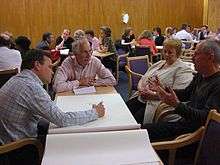World café

A World Café or Knowledge Café is a structured conversational process for knowledge sharing in which groups of people discuss a topic at several tables, with individuals switching tables periodically and getting introduced to the previous discussion at their new table by a "table host".
Concept
A café ambience is created in order to facilitate conversation. In some versions, a degree of formality is retained to make sure that everyone gets a chance to speak.[1] Alternatively, the café concept can be taken more literally with everyone potentially talking at once.
As well as speaking and listening, individuals may be encouraged to write down some of their results to inform subsequent people at that table when continuing with this topic. Although pre-defined questions may have been agreed upon at the beginning, outcomes or solutions are not decided in advance.[2] [3] An underlying assumption of World Café events is that collective discussion can shift people's conceptions and encourage collective action.[4]
The World Café concept originated at the home of Juanita Brown and David Isaacs in 1995 when a "large circle" conversation became disrupted by rain.[5]
Method
World Café events tend to have at least twelve participants, but there is theoretically no upper limit.[6] Groups of about four to six participants sit around tables, together with a "table host", and discuss questions which have been agreed upon at the beginning of the event or defined by the organisers in advance. Each table has a different set of questions belonging to a comprehensive theme. After approximately 20 minutes participants move to a next table where another topic - which ideally is built upon the previous one - is discussed. Discussion results are directly noted down on a makeshift paper table-cloth or a nearby flip chart. The "table host" welcomes new participants and informs them about the results of the previous discussion at the table. Finally, the results of all groups will be reflected on in a common plenum session. Strategies for further actions and opportunities for further cooperation of participants are identified. [7]
Variant: Knowledge café
In the version used by David Gurteen (who uses the term "Knowledge Café"), the small group discussions are not led by a facilitator, and no summary is captured for subsequent feedback to the group - the aim is to maximise time spent in conversation and so time spent with one person presenting is minimised.[8]
Examples
In Israel in 2011 an event called 1,000 Tables was hosted in several cities on a single day as part of a series of social justice protests held around that time, and around a thousand people participated.[9]
Another example of a World Café event was one held in Ohio in 2005 with around sixty people, focused around the question "What does ending hunger mean to you?".[10]
See also
References
- ↑ Elliott, Janice; Heesterbeek, Sara; Lukensmeyer, Carolyn J.; Slocum, Nikki (2005). Steyaert, Stef; Lisoir, Hervé, eds. Participatory methods toolkit : a practitioner's manual. [Brussels]: King Baudouin Foundation / Flemish Institute for Science and Technology Assessment. pp. 185ff. ISBN 978-90-5130-506-7.
- ↑ Christopher M. Bache (28 August 2008). The Living Classroom: Teaching and Collective Consciousness. SUNY Press. ISBN 978-0-7914-7646-8.
- ↑ Merianne Liteman; Sheila Campbell; Jeffrey Liteman (14 July 2006). Retreats That Work: Everything You Need to Know About Planning and Leading Great Offsites. John Wiley & Sons. pp. 48–. ISBN 978-0-7879-8643-8.
- ↑ Sarah Lewis (16 March 2011). Positive Psychology at Work: How Positive Leadership and Appreciative Inquiry Create Inspiring Organizations. John Wiley & Sons. ISBN 978-1-119-99621-7.
- ↑ "World Café History". Retrieved 28 March 2018.
- ↑ Graham Dickson; Bill Tholl (13 January 2014). Bringing Leadership to Life in Health: LEADS in a Caring Environment: A New Perspective. Springer Science & Business Media. pp. 146–. ISBN 978-1-4471-4875-3.
- ↑ "World Café Method". Retrieved 28 March 2018.
- ↑ Gurteen, David (2008). "How to run a Knowledge Café". Gurteen. Retrieved 15 February 2017.
- ↑ Hartman, Ben (10 September 2011). "Round table discussions held in cities across Israel". The Jerusalem Post.
- ↑ Margaret J. Wheatley; Deborah Frieze (11 April 2011). Walk Out Walk On: A Learning Journey into Communities Daring to Live the Future Now. Berrett-Koehler Publishers. pp. 192–. ISBN 978-1-60509-733-6.
Further reading
- Allee, Verna (November 3, 2009). The Future of Knowledge. Routledge. p. 146–148. ISBN 9781136357893.
- Brown, Juanita; Isaacs, David; The World Café Community (2005). The World Café. Berrett-Koehler Publishers. p. 96-98. ISBN 9781605092515.
- Gronau, Norbert (2002). "The Knowledge Café – A Knowledge Management System and Its Application to Hospitality and Tourism". Journal of Quality Assurance in Hospitality & Tourism. 3 (3–4): 75-88. doi:10.1300/J162v03n03_05.
- Kazi, Abdul Samad (November 30, 2004). Knowledge Management in the Construction Industry: A Socio-Technical Perspective. IGI Global. p. 61. ISBN 9781591403623.
- Pasher, Edna; Ronen, Tuvya (2011). The Complete Guide to Knowledge Management. John Wiley & Sons. p. 112–114. ISBN 9781118001400.
- Ramjugernath, Deresh (2015). ICIE 2015 3rd International Conference on Innovation and Entrepreneurship. Academic Conferences Limited. p. 191–193. ISBN 9781910309919.
- Skyrme, David (June 14, 2012). Capitalizing on Knowledge. Routledge. p. 125–. ISBN 9781136422928.
- Yendol-Hoppey, Diane; Dana, Nancy Fichtman (2010). Powerful Professional Development. Corwin Press. p. 83–. ISBN 9781412979757.
External links
- The World Café website
- The World Café Community website
- The Knowledge Café website